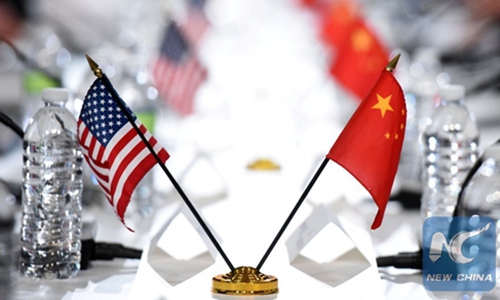China’s vice foreign minister stresses trend of China-US cooperation
Source: Global Times Published: 2020/7/8 15:28:40

File photo taken on November 23, 2016 shows the national flags of the United States and China during the 27th Session of the China-US Joint Commission on Commerce and Trade in Washington DC, US. Photo: Yin Bogu/Xinhua
Nothing can stop the general trend of China-US cooperation, and a decoupling would be impractical and benefit no one in a world where globalization is the order of life, China's Vice Foreign Minister Le Yucheng said on Wednesday.During a video dialogue on Sino-US relations, co-hosted by the Chinese People's Institute of Foreign Affairs and the Asia Society, Le pointed out that competition between China and the US shouldn't be a "zero-sum game," adding that it is dangerous for the US to leverage so-called "proportional costs" to attack China.
"The real enemy of the US is not China. It is the invisible virus and growing non-traditional security threats," he said, suggesting the US should not treat a partner as an adversary, nor should it take a beggar-thy-neighbor approach to relations as doing so would only wear out both sides.
In a world where countries are interconnected as deeply as possible in every aspect, "decoupling is impractical," Le noted.
Citing a recent survey by the American Chamber of Commerce in China which suggested 84 percent of US companies operating in China don't want to leave, and that 38 percent plan to maintain or increase their investment, Le said US businesses are still most interested in the huge Chinese market. Since the beginning of this year, ExxonMobil, Honeywell, Tesla, Walmart and other US companies have been expanding their investments and operations in China.
Looking further, there are many more opportunities for China-US cooperation in ICT, artificial intelligence, online education and telemedicine, Le suggested, asking: "Why would anyone want to cut off the cooperation that has been benefiting both sides? And why would they want to promote the so-called decoupling?"
Pointing to the consequences of a decoupling, he noted that the trade war has wiped out $1.7 trillion of the market values of listed US firms.
When it comes to the US tariffs placed on Chinese goods, he cited a letter co-signed by 160 US companies and sent to the US Congress to urge the lifting of tariffs on China, saying they had cost Americans $50 billion more in duties in 2019 and raised average household expenditure by $1,277.
"China will remain firmly committed to opening up wider to the outside world, and the door to cooperation will remain open to all countries, including the US," the vice foreign minister stressed.
Rejecting the idea of an anti-China bloc, Le said "China will not be isolated" and "it is impossible to exclude a market of 1.4 billion people."
Throughout the COVID-19 pandemic, China has provided assistance to four international organizations and 150 countries - including the US, to which China offered an average of more than 60 masks for every American.
China's assistance and support for other countries serves no selfish interests, and has no strings attached, Le said, emphasizing that "China is by no means seeking geopolitical influence or predominance."
The official acknowledged the China-US relationship has found itself at a crossroads, with a historic choice about its future hanging in the air. But Le is optimistic about the future of China-US relations.
"Although the relationship is overcast by dark clouds, the sky will not fall, and the sun will eventually shine again. Likewise, nothing can stop the general trend of China-US cooperation," he said.
Global Times
Posted in: ECONOMY